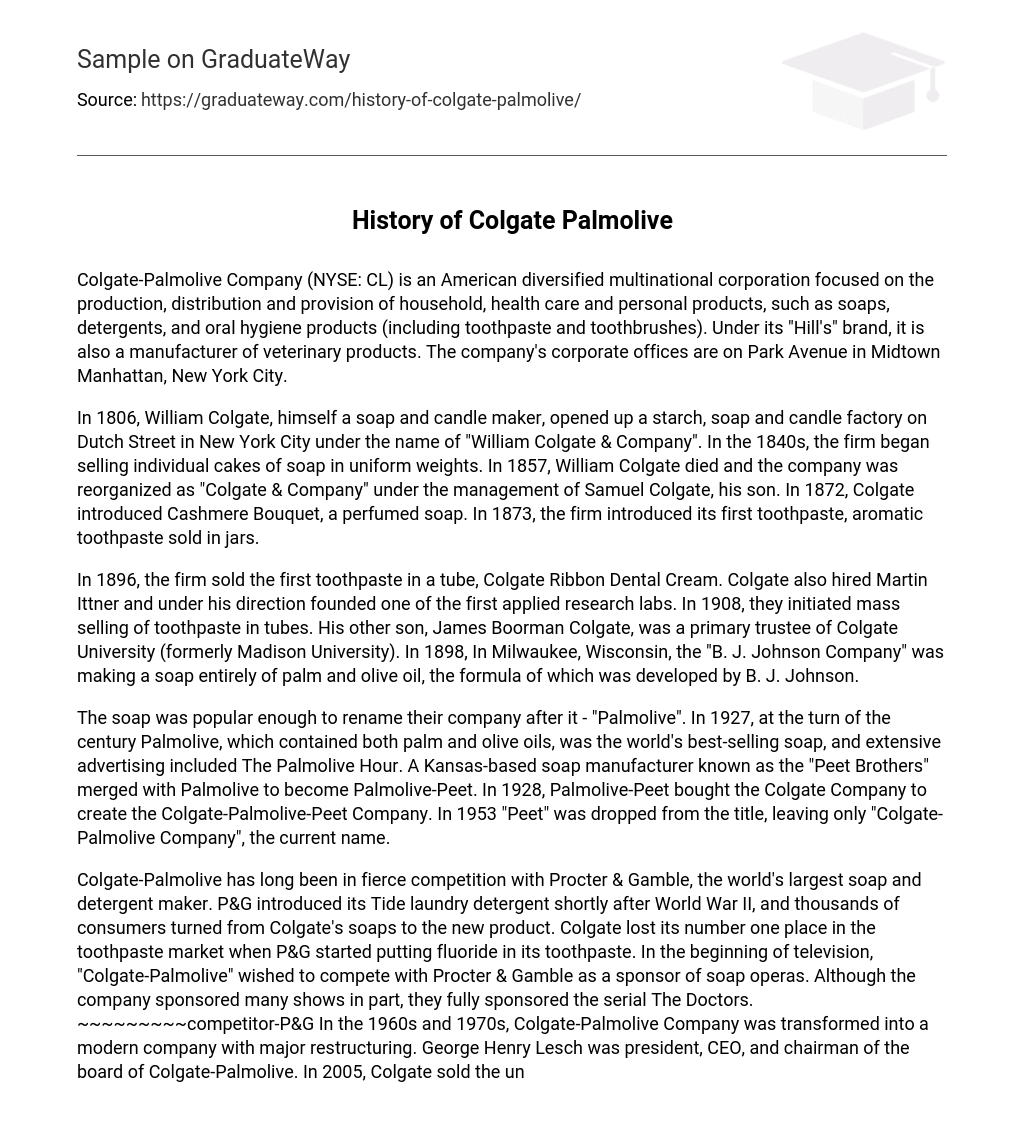Colgate-Palmolive Company (NYSE: CL) is an American diversified multinational corporation focused on the production, distribution and provision of household, health care and personal products, such as soaps, detergents, and oral hygiene products (including toothpaste and toothbrushes). Under its “Hill’s” brand, it is also a manufacturer of veterinary products. The company’s corporate offices are on Park Avenue in Midtown Manhattan, New York City.
In 1806, William Colgate, himself a soap and candle maker, opened up a starch, soap and candle factory on Dutch Street in New York City under the name of “William Colgate & Company”. In the 1840s, the firm began selling individual cakes of soap in uniform weights. In 1857, William Colgate died and the company was reorganized as “Colgate & Company” under the management of Samuel Colgate, his son. In 1872, Colgate introduced Cashmere Bouquet, a perfumed soap. In 1873, the firm introduced its first toothpaste, aromatic toothpaste sold in jars.
In 1896, the firm sold the first toothpaste in a tube, Colgate Ribbon Dental Cream. Colgate also hired Martin Ittner and under his direction founded one of the first applied research labs. In 1908, they initiated mass selling of toothpaste in tubes. His other son, James Boorman Colgate, was a primary trustee of Colgate University (formerly Madison University). In 1898, In Milwaukee, Wisconsin, the “B. J. Johnson Company” was making a soap entirely of palm and olive oil, the formula of which was developed by B. J. Johnson.
The soap was popular enough to rename their company after it – “Palmolive”. In 1927, at the turn of the century Palmolive, which contained both palm and olive oils, was the world’s best-selling soap, and extensive advertising included The Palmolive Hour. A Kansas-based soap manufacturer known as the “Peet Brothers” merged with Palmolive to become Palmolive-Peet. In 1928, Palmolive-Peet bought the Colgate Company to create the Colgate-Palmolive-Peet Company. In 1953 “Peet” was dropped from the title, leaving only “Colgate-Palmolive Company”, the current name.
Colgate-Palmolive has long been in fierce competition with Procter & Gamble, the world’s largest soap and detergent maker. P&G introduced its Tide laundry detergent shortly after World War II, and thousands of consumers turned from Colgate’s soaps to the new product. Colgate lost its number one place in the toothpaste market when P&G started putting fluoride in its toothpaste. In the beginning of television, “Colgate-Palmolive” wished to compete with Procter & Gamble as a sponsor of soap operas. Although the company sponsored many shows in part, they fully sponsored the serial The Doctors. ~~~~~~~~~competitor-P&G In the 1960s and 1970s, Colgate-Palmolive Company was transformed into a modern company with major restructuring. George Henry Lesch was president, CEO, and chairman of the board of Colgate-Palmolive. In 2005, Colgate sold the under-performing brands Fab, Dynamo, Arctic Power, ABC, Cold Power and Fresh Start, as well as the license of the Ajax brand for laundry detergents in the U. S. , Canada and Puerto Rico, to Phoenix Brands, LLC as part of their plan to focus on their higher margin oral, personal, and pet care products.
In 2006, Colgate-Palmolive announced the intended acquisition of Tom’s of Maine, a leading maker of natural toothpaste, for US $100 million. Tom’s of Maine was founded by Tom Chappell in 1970. Today, Colgate has numerous subsidiary organisations spanning 200 countries, but it is publicly listed in only two, the United States and India. In June 2007, counterfeit Colgate toothpaste imported from China was found to be contaminated with diethylene glycol, and several people in eastern U. S. reported experiencing headaches and pain after using the product.
The tainted products can be identified by the claim to be manufactured in South Africa by Colgate-Palmolive South Africa LTD, they are 5oz/100ml tubes (a size which Colgate does not sell in the United States) and the tubes/packaging contain numerous misspellings on their labels. Colgate-Palmolive claims that they do not import their products from South Africa into the United States or Canada and that DEG is never and was never used in any of their products anywhere in the world. The counterfeit products were found in smaller “mom and pop” stores, dollar stores and discount stores in at least four states.





